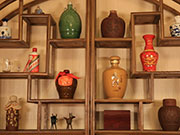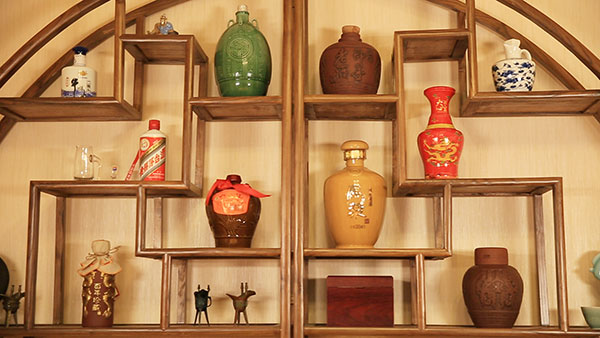Chinese liquor: What a foreigner needs to know

- By Wei Jia
 0 Comment(s)
0 Comment(s) Print
Print E-mail China.org.cn, December 4, 2015
E-mail China.org.cn, December 4, 2015
In a 2013 CNN article ranking the world's 10 best drinking nations, China came up second, just behind the Great Britain. While there're no pubs dotting the Middle Kingdom, the consumption of alcoholic drinks, both domestic and foreign, is carried out there with the same verve during many a hearty meal with a gathering of merry people.
 |
|
Chinese liquor: What a foreigner needs to know |
To better appreciate how Chinese love their liquor, there're some basic facts you need to know about China's homegrown alcoholic beverages, as foreign drinks still play second fiddle to the traditional inhibition-busters during a boozy banquet.
It takes a "strong" liquor to stand the test of more than 4,000 years, and Chinese liquor boasts an array of fiery types. Baijiu (pronounced 'bye-jyoh'), the most popular Chinese liquor and easily the world's largest spirit category by sales—accounting for $92.4 billion in 2012, according to the International Wine and Spirit Research group—generally has an alcohol by volume of 40–60%, comparable to that of the legendary spirit vodka .
Baijiu is identified by smell into four main categories: nong xiang (strong scent), qing xiang (light scent), jiang xiang (sauce scent), and mi xiang (rice scent). Choose your poison.
When you do get over the barrier of unfamiliarity of Chinese liquor and fancy a taste of the firewater from the East, there're some brands you could do worse than look out for. Leading the trio is Maotai, China's national liquor favored by the wealthy and craved by the rest. No matter how humble a meal is, a bottle of Maotai would unfailingly turn it into a royal feast. Coming in second is Wuliangye (literally five-grain juice), whose mellow and luscious taste ensures its place at important feasts. Rounding up the three most-liked Chinese liquor brands is Luzhou Laojiao (laojiao means old celler) , known for its uniquely pungent and subtly fruity aroma.
Don't worry if you find these tongue-twisters hard to pronounce, let alone remember when you are trying to buy or order some Chinese baijiu. Ask your Chinese friends for help, or even better, join them for a meal with Chinese liquor.
When you are drinking Chinese liquor with Chinese, brace yourself not only for the burning sensation the highly alcoholic drink would bring as it sears down your throat, but also for the boisterous revelers eager to show you their goodwill via brimful receptacles.
The Chinese word dreaded by those who can't hold their liquor is "ganbei," which means bottoms up. When your host shouts out the word, you are expected to raising your glass like all the other people and touch each person's glass, or tap the table with your glass instead, before empting the content in your it, the faster the better, because putting yourself through the same ordeal as your host does is a bonding experience with instant effect. Let the alcohol does its work in taking down your guard and you will soon find yourself confiding in other similarly bleary-eyed, mumbling people at the table.
That's probably why many a problem has been solved and many a deal struck between shots of Chinese liquor. The alcohol dissolves the distance between people and forms trust, however transit, between them. So if you are thinking about living or working in China, getting yourself familiar with Chinese liquor and the basic etiquette surrounding it may give you an edge in making Chinese friends and sealing deals with Chinese businessmen.
In case Chinese liquor gets the better of you after a wild session, you can try drinking honey water, milk, or tea with lemonade to blunt the hangover.
If you are not comfortable with the taste of Chinese liquor, however, it's always all right to tell your host you are not good at drinking. They may insist that you share their alcohol-fuelled fun for a while, but be polite and firm in your refusal, and they will eventually leave you alone and not think any less of you as a result.
Not particularly open with their emotions, Chinese people resort to liquor to be forthright and unload their mind and heart. Try Chinese liquor and feel the transformative effect it has on hundreds of millions of people.






Go to Forum >>0 Comment(s)